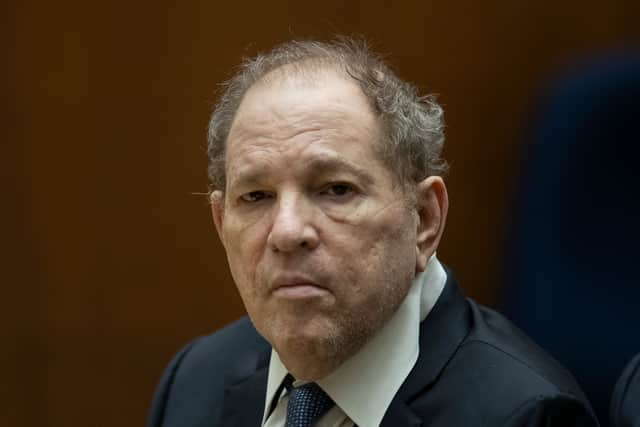New York appeals court overturns Harvey Weinstein’s 2020 rape conviction ordering new trial
and live on Freeview channel 276
New York's top court has overturned Harvey Weinstein's 2020 rape conviction, stating that the judge in the landmark #MeToo trial unfairly influenced the ex-Hollywood producer through questionable rulings, one of which was to allow women to testify about unrelated allegations.
The court's decision read, “We conclude that the trial court erroneously admitted testimony of uncharged, alleged prior sexual acts against persons other than the complainants of the underlying crimes.” It further stated that “The remedy for these egregious errors is a new trial.”
Advertisement
Hide AdAdvertisement
Hide AdThis ruling reopens a painful period in America's confrontation with sexual misconduct by influential individuals, which began with allegations against Weinstein in 2017. It means his accusers might have to revisit their traumatic experiences in court.
The majority of the court criticised allowing unproven allegations to tarnish Weinstein's character without shedding light on his credibility concerning the charges against him. In a dissenting opinion, Judge Madeline Singas criticised the majority for altering facts to fit a simplistic narrative and accused the court of perpetuating outdated views on sexual violence.


Weinstein, currently serving a 23-year sentence in New York for a 2006 assault and a 2013 rape, will remain in prison due to a separate 2022 conviction in Los Angeles. Weinstein's defense argued that Judge James Burke's decisions favoured the prosecution, turning the trial into “1-800-GET-HARVEY”. They claimed the judge allowed testimony beyond the scope of the case, effectively putting Weinstein on trial for uncharged crimes.
Weinstein's lawyer, Arthur Aidala, contended that Weinstein wanted to testify but refrained due to the broad scope of questioning permitted by Judge Burke. Aidala argued, “We had a defendant who was begging to tell his side of the story. It's a he-said, she-said case, and he's saying 'that's not how it happened. Let me tell you how I did it'.”
Advertisement
Hide AdAdvertisement
Hide AdThe reversal of Weinstein’s conviction marks another setback for the #MeToo movement, following the US Supreme Court's refusal to review Bill Cosby’s sexual assault conviction in Pennsylvania.
Allegations against Weinstein, a once-powerful film executive behind acclaimed movies, triggered the #MeToo movement. Many women, including well-known actresses like Ashley Judd and Uma Thurman, accused him. His New York trial attracted significant media attention, with protesters outside the courthouse.
Weinstein is incarcerated in Mohawk Correctional Facility in New York, maintaining his innocence and insisting any sexual encounters were consensual. Weinstein's legal team argued that Judge Burke's decisions tainted the trial and violated Weinstein's rights. They also contested the judge's refusal to dismiss a juror who had written a book involving themes similar to Weinstein’s case.
The Manhattan district attorney's office defended the judge's rulings, stating they provided necessary context about Weinstein's behaviour. Appellate Chief Steven Wu argued that the extra testimony countered Weinstein’s claims of a consensual relationship.
Advertisement
Hide AdAdvertisement
Hide AdWeinstein's acquittal on some charges, including those involving actress Annabella Sciorra's allegations, suggested jurors were attentive and not overwhelmed by additional testimony.
The Court of Appeals took up Weinstein’s case after a lower appellate court upheld his conviction. Prior to their decision, the lower court judges had expressed concerns about Judge Burke's actions. Weinstein's legal team sought a new trial only for the criminal sexual act charge, as the rape charge was beyond the statute of limitations.
Comment Guidelines
National World encourages reader discussion on our stories. User feedback, insights and back-and-forth exchanges add a rich layer of context to reporting. Please review our Community Guidelines before commenting.
